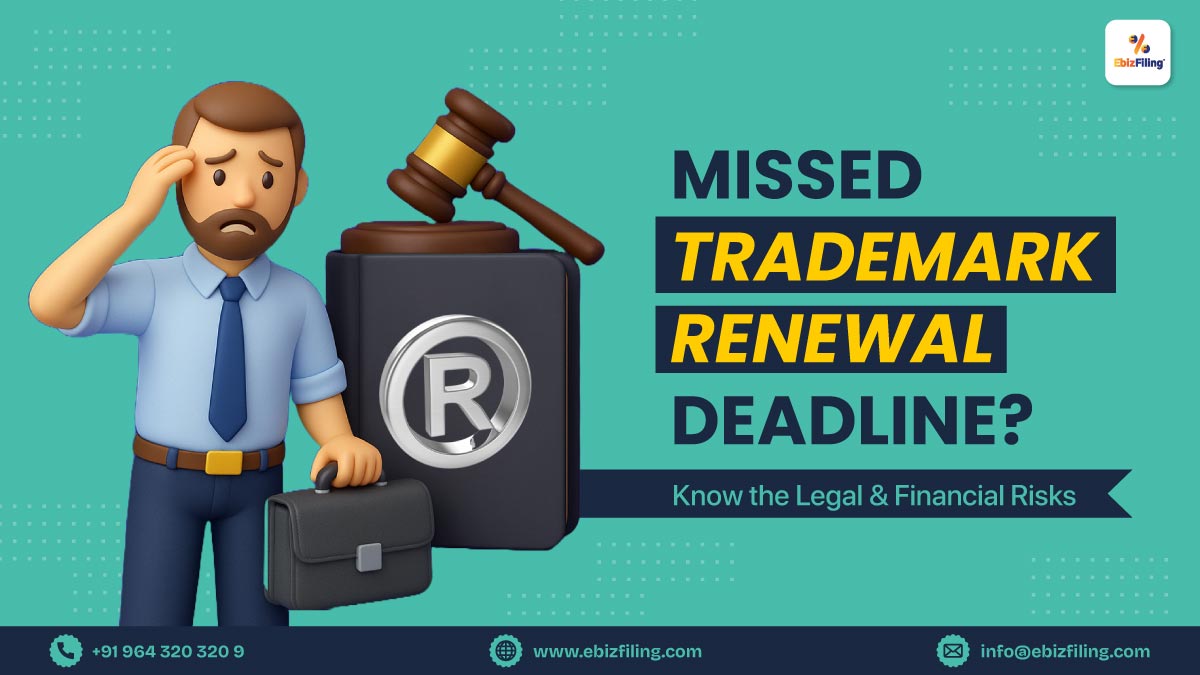
-
June 6, 2025
Trademark Renewal Delays: Legal Impact and Costs
Introduction
A registered trademark protects your brand identity and grants exclusive usage rights. But what happens when you miss its renewal date? Trademark renewal delays can cause serious legal and financial problems. This article simplifies the impact and costs involved and explains what to do next.
What is Trademark Renewal and Why is It Important?
Trademark renewal is the process of extending your trademark rights beyond the initial 10-year validity period. If not renewed on time, your trademark can be removed from the register.
Why it matters:
- It secures your brand identity.
- It maintains legal ownership and protection.
- It avoids costly legal battles from third parties misusing your brand.
You can renew a trademark anytime within one year before its expiry or during a 6-month grace period after expiration.
Reference: IP India – Trademark Renewal
What Happens When You Delay Trademark Renewal?
Delaying renewal doesn’t just mean paying a late fee. It can result in the loss of exclusive rights and open doors for others to misuse your brand.
Legal Consequences of Trademark Renewal Delays
- Loss of Legal Rights: You lose legal ownership and protection over the trademark.
- Brand Misuse Risk: Anyone may file for your brand name or misuse your mark without legal consequences.
- Re-registration Requirement: You might need to go through the full application process again.
- Infringement Issues: If someone else uses your lapsed trademark, you can’t take legal action.
- Opposition by Third Parties: Others may register similar marks during the lapse period.
Financial Costs Due to Delayed Trademark Renewal
| Type | Estimated Cost (in INR) |
|---|---|
| Trademark Renewal (on time) | ₹9,000 (per class) |
| Late Renewal (within grace) | ₹9,000 + ₹4,500 surcharge |
| Restoration after removal | ₹9,000 + ₹9,000 (restoration) |
| Legal expenses (if challenged) | ₹25,000 – ₹1,00,000+ (approx.) |
Note: These are approximate fees and may vary as per government updates.
How to Renew a Trademark in India: Step-by-Step Process
Trademark Renewal Process (Online)
- Prepare Form TM-R: Application for renewal under Section 25.
- Attach Documents: Power of Attorney (if agent applies), Trademark certificate.
- Pay the Fee: As per the class and deadline.
- Track Status: Check updates on ipindia.gov.in
- Receive Confirmation: Once approved, it is renewed for another 10 years.
Documents Required
- Copy of the registration certificate
- Power of Attorney (if applying through an agent)
- ID proof of trademark owner
- Renewal form (TM-R)
What Are the Benefits of Timely Trademark Renewal?
- Retains Brand Ownership: Keeps exclusive rights to use your trademark.
- Avoids Extra Fees: Saves late penalty and restoration charges.
- Protects Market Position: Maintains competitive advantage and goodwill.
- Prevents Legal Disputes: Avoids third-party claims on your mark.
What are the Common Reasons Behind Trademark Renewal Delays?
- Lack of awareness about renewal deadlines
- Change in business structure or ownership
- Communication gap with trademark agents
- Ignoring the registrar’s reminder notices
- Delay in fee arrangements
Real-Life Example: Why It’s Risky
A small apparel business registered its logo in 2012 but forgot to renew it in 2022. In 2023, a competitor filed for a similar mark. The original business lost its exclusive rights and had to spend over ₹1 lakh in legal and re-registration fees.
How Can Ebizfiling Help with Timely Trademark Renewal?
- Filing of TM-R with correct documentation
- Online renewal tracking
- Representation during objections (if any)
- Timely alerts before expiration
- Assistance with restoration and reapplication if delayed
Why Delays in Renewal Can Be Riskier for Growing Startups?
Startups depend heavily on their brand identity. Missing renewal deadlines may:
- Reduce investor confidence
- Harm brand reputation
- Block expansion in new markets
- Cause unnecessary legal costs
Conclusion
Delaying trademark renewal can have serious consequences; both legally and financially. To avoid losing your brand’s identity and value, ensure your trademark is renewed on time. Partnering with professionals like Ebizfiling ensures you stay ahead of deadlines and avoid penalties. Stay compliant, secure your brand, and continue growing with confidence.
Suggested Read :
Trademark Clearance Certificate
Types of Trademark Assignments
International Trademark Assignment
Trademark Renewal vs Trademark Restoration
FAQs
1. What is the validity of a registered trademark in India?
It is valid for 10 years from the date of registration.
2. Can I renew a trademark after it expires?
Yes, within a 6-month grace period or by applying for restoration.
3. What is the late renewal penalty?
₹4,500 per class in addition to the regular fee.
4. What happens if I don’t renew the trademark?
Your trademark may be removed from the register, and you lose legal rights.
5. Is the renewal fee the same for all classes?
Yes, ₹9,000 per class for online filing.
6. Can I renew the trademark offline?
Yes, but online is faster and recommended.
7. How can Ebizfiling help in trademark renewal?
We handle filing, reminders, documentation, and support in case of objections.
8. Is restoration possible after the grace period?
Yes, but it requires an additional fee and explanation to the Registrar.
9. Will the trademark number change after renewal?
No, the registration number remains the same.
10. Can anyone else claim my trademark if I delay renewal?
Yes, if your mark lapses, others can apply for it.
Trademark Renewal
Renew your trademark in simple steps with EBizfiling
About Ebizfiling -










June 19, 2025 By Team Ebizfiling
How to Transfer IP Rights from Foreign Parent to Indian Entity? Introduction Transferring IP rights from a foreign parent to an Indian entity is an important step for global businesses expanding into India. It helps Indian subsidiaries gain legal ownership […]
July 15, 2025 By Team Ebizfiling
January 16, 2025 By Team Ebizfiling
Difference Between Authorized Capital and Dividend Distribution Introduction Authorized capital and dividend distribution are critical financial concepts for companies, particularly in India. These terms reflect distinct aspects of a company’s financial structure and decision-making processes. The company may issue a […]